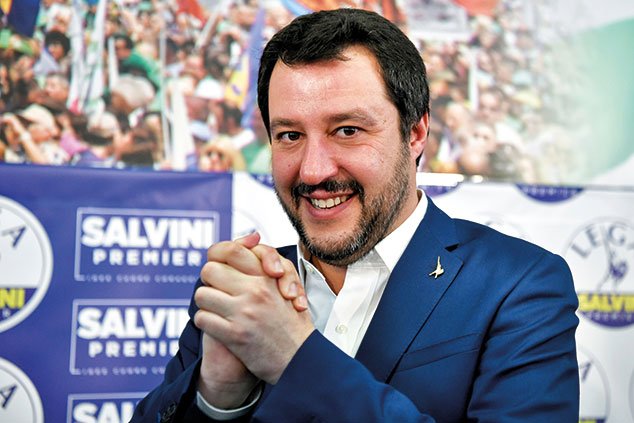
Matteo Salvini has helped lead the populists to power. But does the middle-class ex-communist who has never held a job outside politics have any coherent vision for his country? Jane Lewis reports.
To his many critics, Matteo Salvini, the leader of Italy’s right-wing Liga Nord, is a “racist opportunist” who is about to take the country “down a dangerously confrontational and xenophobic path”, says The Guardian. To his supporters he is a “warrior”, whose appointment last week as deputy prime minister and interior minister in an unlikely coalition with the left-wing Five Star Movement “is a symbol of the country’s much-needed pivot to the right”.
Salvini, 45, has long nurtured the ambition of becoming “the first populist leader of a big European nation”, says The Sunday Times. It was no coincidence that he campaigned under the Trump-like slogan “Italy First”. But Italy’s new “Everyman leader” is “no Trump”, says Reuters. “While very much a straight talker”, he rarely commits gaffes, “sticks closely to his script” – and has never yet “lost his cool” during a press grilling. During the recent election campaign he maintained “a laser-like focus” on the issues of mass immigration, tax cuts and pensions, capitalising on his “popularity on the TV talk-show circuit” and incessantly tweeting and posting videos
on Facebook.
Salvini sees social media as key to his success. “Thank god for Facebook,” he once observed. But he’s just as adept at pressing more traditional buttons. On the eve of the vote, he appealed to Italy’s Catholics “by waving rosary prayer beads and a bible in front of crowds in Milan as he swore to be faithful to his people”.
From communism to pragmatism
Born into a comfortable Milanese middle-class family, the son of a company manager, Salvini dropped out of university and has never held down a job outside politics. He started his career young, lured by the dream of securing independence for his prosperous home region, Lombardy, from the rest of Italy. At 17, he joined the communist section of the Liga Nord, a small secessionist party, and began campaigning, among other things, for the legalisation of drugs. His big break came in 1999 when he was asked to run Radio Padania, the party’s official radio station, says the Financial Times, which taught him the art of communication. In 2013, when he became leader of the Liga Nord, he transformed a party that had lobbied solely for the north into a nationalist force. He dropped “the rhetoric against poor southerners” and “took aim” at migrants, hooking up with other parties on Europe’s extreme right, and often aligning himself with Russia’s Vladimir Putin.
Salvini early on ditched his communist leanings in the interests of political pragmatism. Many of his policies today are in line with the standard European populist textbook: as well as a 15% flat tax, he favours protectionist tariffs. But some of his ideas are more eccentric, says online magazine Ozy. Last year, he advocated regulating the sex trade and making Italy’s prostitutes pay VAT. His plan was to use the cash to address Italy’s plummeting birth rate by offering financial incentives to cash-strapped would-be mothers.
Salvini “doesn’t love the traditional mechanisms of politics, and doesn’t care about money, nice cars or nice houses”, says a fellow party member. And although his rabble-rousing style plays well to Italians nostalgic for the “good old days”, he speaks witheringly of opponents who want to resurrect the “ghosts of the past”. The recent election, he observes, was all about Italians voting for “the future”. As far as Salvini is concerned, that means him.